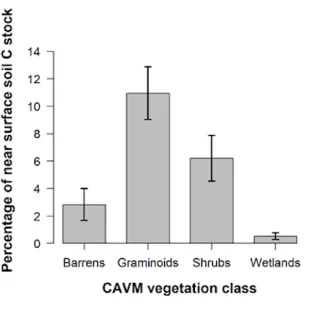Keystone or foundational species, which have a disproportionate impact on ecosystem structure and function, have the potential to be important players in determining the response of the terrestrial ecosystems to environmental change. Yet, foundational species and their role in ecosystem processes remain poorly understood and underrepresented in ecosystem models. NGEE Arctic researchers, working alongside others in the scientific community, show that this is especially true for tundra landscapes, which are often represented as a single or limited number of plant functional types in terrestrial biosphere models. Salvatore Curasi and Adrian Rocha from the University of Notre Dame led a study to evaluate the role of cotton-grass, as a foundational species, to determine ecosystem carbon stocks at 51 sites spanning the Canadian, North America and Siberian arctic. These sites included the NGEE Arctic field site near Council, AK on the Seward Peninsula. Curasi and his colleagues observed that graminoid communities had the highest density and the highest contribution of tussocks to the near surface soil C stock (see Figure), while wetland communities had the lowest density and lowest contribution of tussocks to the near surface soil C stock. Field surveys were supplemented by results from an ecological niche model that projected significant regional shifts in tussock density in 2100 under the RCP 8.5 climate scenario. Optimal climate conditions for tussock density shifted northward with the greatest losses of tussock occurring on the North Slope of Alaska. These shifts in tussock density were translated into carbon losses and compared to projections of vegetation C stocks from an ensemble of terrestrial biosphere models. The findings of this research are leading to an improved understanding of the consequences associated with shifts in Arctic species, and foundational species like cotton-grass, which highlight a need for more detailed investigations of species roles in the ecosystem.
For more information, please contact:
Stan Wullschleger
wullschlegsd@ornl.gov

